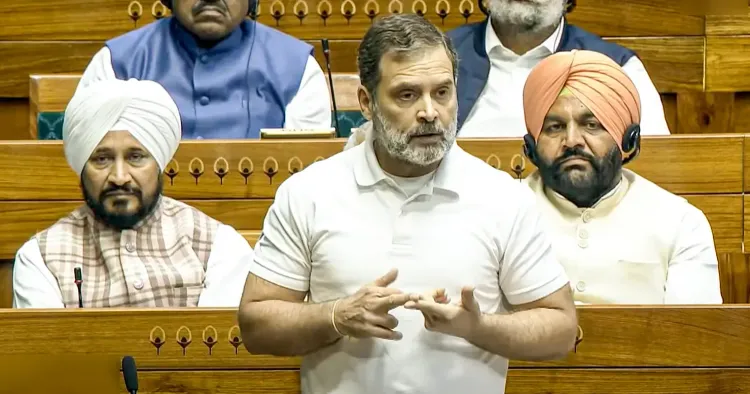Rahul Gandhi Commends ‘Make In India’ Yet Critiques It

Synopsis
Key Takeaways
- Rahul Gandhi praised ‘Make In India’ but criticized its execution.
- Manufacturing GDP has decreased from 15.3% to 12.6% since 2014.
- Unemployment is a pressing national issue.
- Gandhi calls for education on key technologies driving the future.
- China leads India in terms of technological advancements.
New Delhi, Feb 3 (NationPress) Congress MP and the Leader of Opposition (LoP) Rahul Gandhi on Monday expressed a rare commendation for the ‘Make In India’ initiative, even praising Prime Minister Narendra Modi for introducing this ‘good idea’, yet subsequently criticized it by labeling it a ‘damp squib’.
During his speech in the Lok Sabha regarding the Motion of Thanks on the President’s address, Gandhi acknowledged that while the ‘Make in India’ concept was fundamentally sound, the Prime Minister had failed to yield tangible results despite his commendable efforts.
He criticized the NDA administration for permitting the manufacturing sector to shrink from 15.3 percent of the GDP in 2014 to 12.6 percent currently.
Addressing the issue of unemployment, Gandhi remarked that as a nation, India has collectively fallen short in tackling joblessness.
“Both the UPA and NDA have been unable to provide solutions for the youth facing unemployment,” he asserted.
Earlier, he remarked that the President’s address seemed like a reiteration of previous speeches and lacked innovative ideas, offering to present a comprehensive outline for an address that an INDI bloc would deliver upon assuming power.
Labeling unemployment as a societal issue and tying it to social unrest, Gandhi noted that the growing number of incarcerated individuals and the escalating expenditure on police and internal security signify rising social tensions in the nation.
Speaking to policymakers, Gandhi emphasized the need for better organization in national production.
“Since 1990, all governments have excelled in organizing consumption or services, but production or manufacturing has significantly lagged,” he commented.
Gandhi characterized the forthcoming era as the onset of a revolutionary conflict between electric motors and internal combustion engines, highlighting four key technologies driving this revolution: electric motors, batteries, optics, and artificial intelligence.
“Artificial Intelligence alone is ineffective without data. Currently, it is evident that the production data for manufacturing mobile phones or vehicles is predominantly owned by China, while consumption data is held by the US,” he stated, urging India to reflect on the data that will propel its AI revolution.
“The stark reality is that India lacks any substantial data,” he remarked, advocating for educating the youth about these four transformative technologies and establishing a production network to secure access to production data.
He pointed out that China possesses at least a decade's advantage over India in the application of these technologies, emphasizing the urgent need for India to develop capabilities in these fields.
rch/mr









